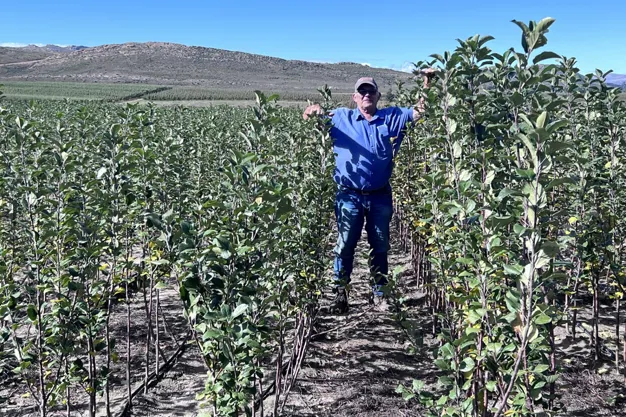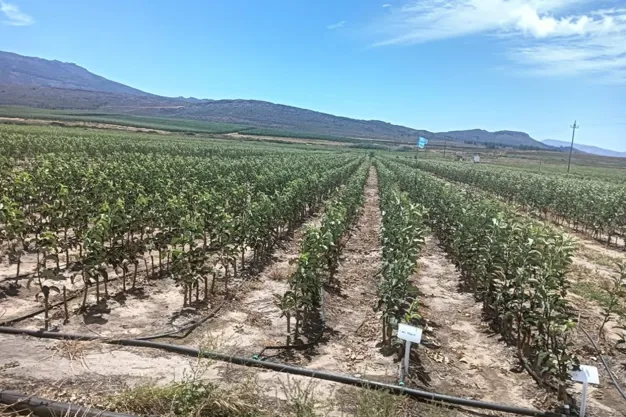Getting a higher export packout all starts from the roots, says Chad Miller, founder of Agrivested, active in South Africa, Mauritius, and Eswatini. "The right species of symbiotic fungi assisting the roots change everything." Agrivested has sole distribution rights to Groundwork BioAg's Rootella range of symbiotic fungi which, he says, no-one else has been able to commercially mass-produce.
The fungal applications, resulting from research at the Volcani institute in Israel, have been trialled with South African producers and nursery managers who report more complete germination, faster growth and a quicker turnaround and higher sales – especially in nurseries where economies of scale really work on the potent product: 15ml of Rootella contains enough fungal spores to cover a hectare, Miller says.
"Redberry strawberry farm in George found they got a higher pack percentage, which allows them to export more strawberries. The roots are better, making plants more resistant to abiotic stress and pathogens. It really does help with producing better quality fruit and getting a higher percentage of A grade fruit for export."
He explains that these symbiotic fungi can extend a plant's root mass hundredfold, which is why the Groundwork BioAg Rootella range is used by farmers in 18 countries. He gives the example of apple saplings grown on in the nursery of De Keur in Ceres: the root mass of inoculated trees weighed six times more than those of control trees, and were 60% larger. When planting out trees into the orchard, they now plan to use Rootella T, the spore mix in tea bag format placed in the planting hole, very easy to use.

Fifteen months into their Rootella trial: De Keur nursery manager Gerhard Lourens with inoculated apple saplings on the right, versus a control group on the left
Seed company Sakata, when applying it to vegetable seeds (with the exception of brassicas), have seen 100% germination and a minimum 40% increase in visual yields. Below ground, the roots were visibly denser and whiter.
Markets require lower chemical use
Changes in the regulatory environment, both within South Africa where a significant number of chemicals will be deregistered from June 2024, as well as in its export markets where ever lower maximum residue levels are required, are driving a shift towards biologicals. "Nobody wants to lose their yields, even in the short term, while they transition to regenerative practices. They want to understand how to minimize chemical fertilizers and transition to a hybrid model. That's why trials are so important – they offer the actual proof that the symbiotic fungi is contributing to sufficient yields. Mycorrhizae are the key to bridging the gap between chemicals and biologicals."
He continues: "The Rootella is so concentrated that no other product can match it, price-wise. Producers report a higher resilience to heatwaves. It allows a reduction of fertilization, cutting phosphorus application by 20 to 30%. Our next goal at Agrivested BioAg is to align with the key seed players in Africa to utilize our premium concentrated liquid product, Rootella L, for seed treatment and allow farmers to inoculate early during sowing."
Increased carbon sequestration
In some cases of plan- fungal association, the plant shares as much as 20% of its carbon with its fungal partners, driving carbon absorption levels. With regenerative agriculture projects in the USA, Groundwork BioAg is building a carbon platform. A farmer needs not change any other practices but by inoculating their crops with Rootella, Miller says, they can sequester three to four times the amount of carbon per hectare.
"We plan to do our first project in the first quarter of 2025: use our product, we'll give you slightly lower ratio of carbon credits instead of 60/70% they get 50% but they don't have to put any other money into the project, and on an annual basis they'll get 50% of value of carbon credits sold back to them while we finance the entire project."
It is a win-win, he says: the farmer gets additional revenue through better and higher yields, better longevity and faster growth, while being rewarded for the carbon sequestration they facilitated.
 Apple saplings on the left were untreated, while those on the right were inoculated with symbiotic AM fungi from the Rootella product range
Apple saplings on the left were untreated, while those on the right were inoculated with symbiotic AM fungi from the Rootella product range For more information:
For more information:
Chad Miller
Agrivested
Tel: +27 82 452 4347
Email: [email protected]
http://www.agrivested.com
